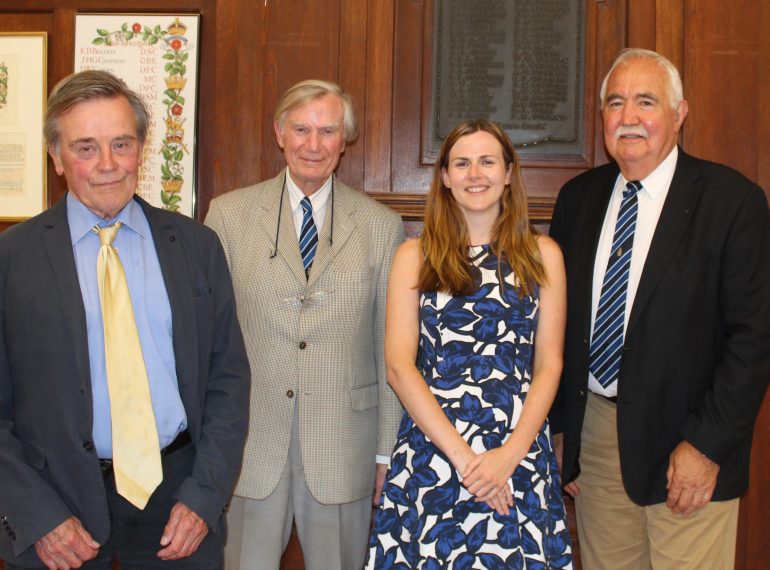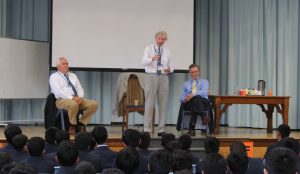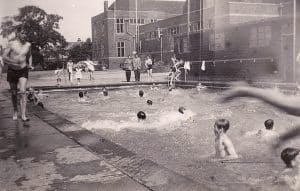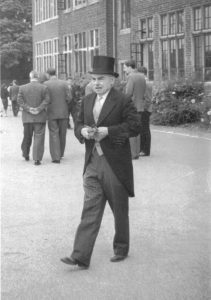The way we were: old boys share memories of the School from more than half a century ago

QE under long-serving Headmaster Ernest Jenkins (1930-1961) was so strict that a prefect punished a boy for buying an ice-cream without wearing his School cap…on a Sunday afternoon.
This was just one of the anecdotes which three alumni from the 1940s–60s shared with current Year 7 pupils to help them with a project looking at the history of the School. In a special assembly, they recalled a School that, like today’s QE, enjoyed both academic and sporting success, yet one which was in many ways very different.
 Ken Cooper (OE 1942–1950), David Farrer (1954–1961) and John Todd (1958–1964) were introduced by Head of History Helen MacGregor. There was an opportunity for the Year 7 boys to ask them questions, which typically focused largely on the disciplinary regime of the time!
Ken Cooper (OE 1942–1950), David Farrer (1954–1961) and John Todd (1958–1964) were introduced by Head of History Helen MacGregor. There was an opportunity for the Year 7 boys to ask them questions, which typically focused largely on the disciplinary regime of the time!
The hapless young ice-cream buyer was ordered to write lines when he was caught bare-headed one hot weekend making his purchase from a shop near his home in Southgate. Although the older pupil was within his rights – prefects of the time were authorised to dole out such punishments and boys were supposed to wear their caps even when not at school – the visiting alumni recalled that he was considered by his classmates to have gone too far, even by the strict standards of the day.
The three visitors reminded the boys that the School was much smaller in the 1940s and 1950s, with a roll of only about 400-450 boys, split into four Houses, not the current six. The School was very much less diverse and boys typically lived very locally.
All indoor activities took place in QE’s Main Building, with the hall even being used for lunch for a time after the refectory was bombed by the Luftwaffe in 1941. The lunches themselves were reported to have been dreadful. “The potatoes were black; the meat looked like it had come off the bottom of someone’s shoe,” said Mr Cooper.
 At first, all that lay behind the Main Building was the ‘Gun Field’. Later, an unheated, open-air swimming pool was built; boys were expected to swim in it in all weathers.
At first, all that lay behind the Main Building was the ‘Gun Field’. Later, an unheated, open-air swimming pool was built; boys were expected to swim in it in all weathers.
The whole School met each morning for assembly, addressed by the Headmaster in his gown: all masters (teachers) wore gowns daily, while prefects wore half-length undergraduate-type gowns.
School ran six days a week, with games on Wednesday and Saturday afternoons. Sport was a huge part of School life and was very popular: the best memories of many Old Elizabethans from that era are from sports on Stapylton Field, the visitors stated. The rugby and cricket were both good, and QE established a very strong reputation in athletics. Fixtures against the top public schools had been established by Mr Jenkins (pictured below), who modelled the School on such institutions during his long headmastership, which extended from 1930–1961.
 During his tenure, the strictness of the regime was seen in the use of corporal punishment. The cane was still very much in use and boys could, in the schoolboy slang of the time, be ‘whacked’ for a variety of misdemeanours. The three alumni reported, though, that they accepted this as being a normal part of school education and thought that there was usually good reason for the punishment! Mr Todd recalled going to be caned and being asked to select which of three different canes should be used. He remembered being concerned that it would be very obvious that he had hidden a workbook down the back of his trousers to cushion the blows, although this was, in fact, not commented upon by the master.
During his tenure, the strictness of the regime was seen in the use of corporal punishment. The cane was still very much in use and boys could, in the schoolboy slang of the time, be ‘whacked’ for a variety of misdemeanours. The three alumni reported, though, that they accepted this as being a normal part of school education and thought that there was usually good reason for the punishment! Mr Todd recalled going to be caned and being asked to select which of three different canes should be used. He remembered being concerned that it would be very obvious that he had hidden a workbook down the back of his trousers to cushion the blows, although this was, in fact, not commented upon by the master.
While much has obviously changed, the visitors reflected that in 2018, just as in their day, expectations at the School are high, both in terms of behaviour and of academic attainment. A grammar school then and now, QE through to the early 1960s had a good reputation for sending boys to Oxbridge and other top universities, albeit in a context in which only about 3% of sixth-formers nationally went on to university, with most school-leavers going straight into employment.
Although they had very positive memories of their time at QE, the three visiting old boys were in little doubt that the fabric of the School, the opportunities available to boys and the outcomes achieved are all very much better now.
Year 7 will be continuing their work on the History project through the rest of this term.
